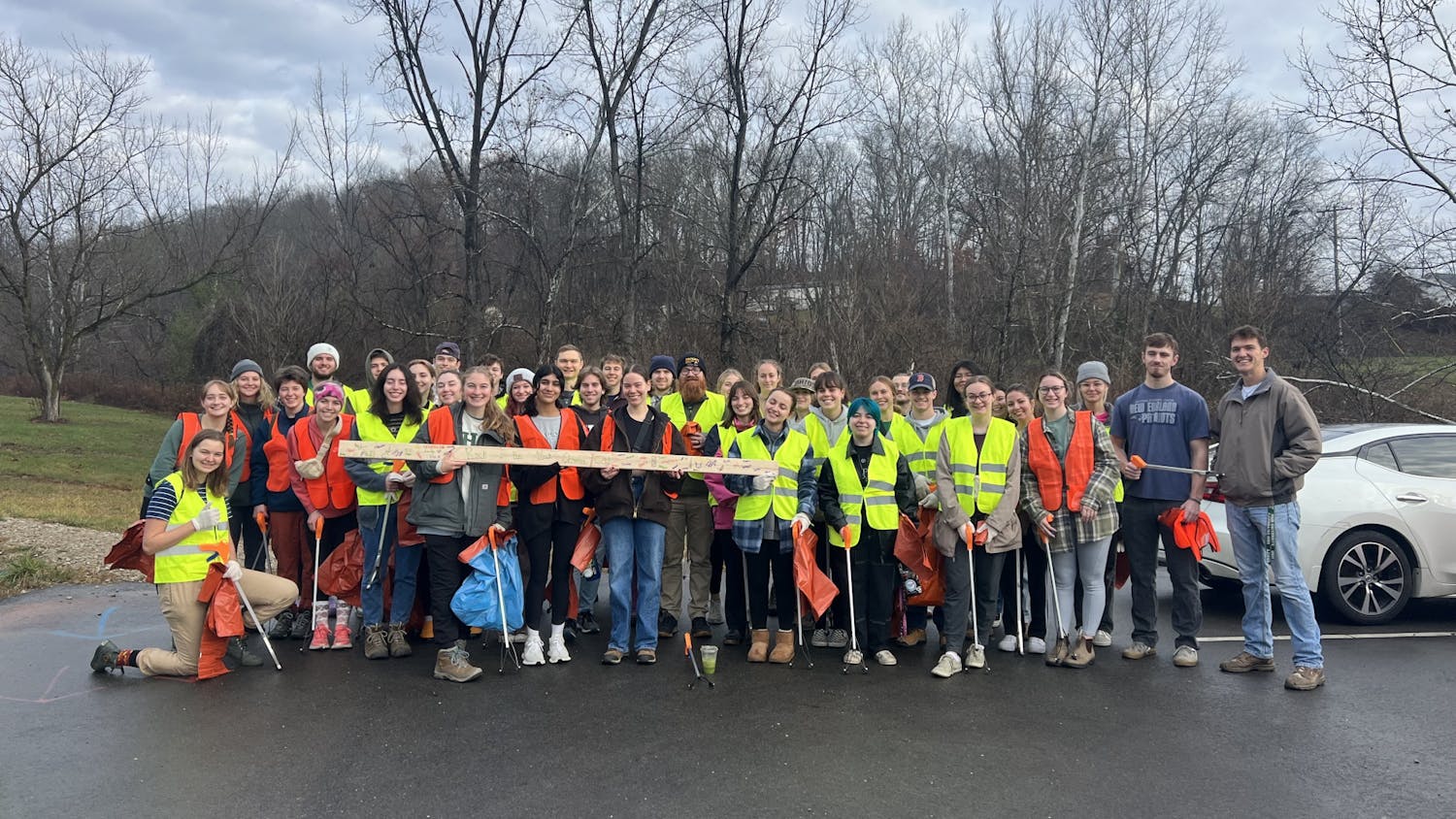Ana Schmitt sits with her blue hair flowing in the wind. Slightly fidgeting and keeping her hair out of her eyes, a large tattoo of a phoenix peeks out from her v-neck shirt tucked into her skirt. She said she’s never felt more alive.
She feels alive not because she became anything new. Not because she changed herself, she just transitioned into the person she always was. But it wasn’t easy.
Schmitt, a fifth-year studying history, said it started with experimenting with women’s clothes. Then moving to using a feminine name and female pronouns. Lastly, it was hormones to complete her trans* identity.
“A few months in on hormones I actually was sitting down with a therapist, and I normally said during therapy just because it’s what they wanted to hear, I would say ‘I really want to live.’ I said it with this woman and I stomped and I wept because it was the first time I ever meant it that I could remember,” Schmitt said.
For many trans individuals, the change may not be this drastic. Maybe it’s just changing your name or preferred pronouns. Non-transitioning trans still make up a large portion of the population, even when stars such as Laverne Cox, star of Orange is the New Black and host/producer of upcoming show The T Word, are becoming celebrations following full surgical transitions.
But for Schmitt, hormones weren’t just an option after a month. It was a necessity to her happiness. It has been over a year since she has been on hormones.
“I would sooner go without food than without hormones, that’s me though, that’s where my priorities lie,” Schmitt said.
The coming out process was also difficult for Schmitt, who prefers the term trans*. Although friends accepted her here, her family cut her off, but agreed to help pay off enough of her debt to keep her in school. Struggling with depression, homelessness and attempted suicide, she says that those who are not out should be able to “exist as an island” if needed.
Schmitt and Landon Cohen, a senior studying English, said Athens has been, for the most part, a safe place. Cohen said he has been on hormones over a year and a half; six months ago he removed his breasts by getting “top surgery.”
HEALTH CARE
The student health insurance plan, acquired by the university, includes transgender services. Schmitt and Cohen are both on the plan, which they say has helped them afford hormones. For Cohen, it’s also helped him afford surgery.
The student health insurance plan is $1,636 for the year, but payments are split bi-yearly, said Anna Wenning, student health insurance administrator, in an email statement. The coverage allows up to $25,000 per policy year for transgender services. These include office visits, hormone therapy, lab testing and gender-confirming surgery.
“There is no extra cost for the ‘transgender’ part of the plan –– it is included for all students who purchase the plan,” Wenning said.
Co-pays for hormones can range from $5 to $45 depending on the prescription and pharmacy.
All Campus Care employees are SafeZone trained, and the transgender policy was added to the plan in the 2012-13 academic year, with the final decision approved by Student Senate, Wenning said.
For surgeries, the annual In-Network deductible is $150, and once it has been met, covered services are paid at 80 percent of a reduced rate, and then the patient is responsible for the remaining 20 percent and any additional copays. For Out-of-Network, the deductible increases to $300 and the ratio changes from 60 percent insurance, 40 percent student.
Wenning said her and Dr. Jane Balbo of Campus Care have worked together and are still listening to feedback and looking to “continually adapt the policy to meet those needs.”
“I would like them to know that there are doctors working at Campus Care who are skilled and competent in caring for transgender and gender-nonconforming people,” Balbo said. “Transgender students do not need to see a specialist to have their health care needs addressed.”
Counseling and Psychological Services also helped Cohen, where he participates in support groups and is able to network with others in the trans and Athens communities.
JUST LIKE EVERYONE ELSE
With a lot of questions circling the trans community, Schmitt said people who she chooses to come out to can be rather frank. Rude, even.
“Anytime I tell anyone, I go through the laundry list of stereotypical questions, asking about my genitals, as if that’s OK to ask about,” Schmitt said.
Schmitt said she has the fortunate, but also unfortunate, ability to pass in public. In other words, Schmitt can appear as a girl when you walk by her on the streets. Some other trans individuals do not have that advantage.
“I am fortunate that I’m able to pass in public,” Schmitt said. “I hate that word ‘passing’ being the way to describe people who are not immediately perceived to be trans ... for example in my case I am perceived the same way as cis-women would be perceived very frequently.”
Cohen said he just wants people to understand he’s like everyone else.
“I’m a student, I go to class, I procrastinate, I do the same things, I just have different routines just like anybody else,” Cohen said. “Just like somebody with diabetes has to take insulin everyday, I have to inject myself with hormones every week.”
For Schmitt and Cohen, they said it’s the everyday issues that most people wouldn’t think about that become an issue for them, like changing gender markers or job discrimination. Being misgendered at all “feels shitty,” Cohen said.
“There are going to be obstacles that I have to face, especially like changing my name legally and changing my gender marker on my license and stuff like that and getting jobs and having to explain that kind of stuff if I have to, job discrimination and stuff like that,” Cohen said.
“I’m so incredibly lucky and grateful for this opportunity to do what I’m doing because there are so many people who wait years and years to transition and they never have that opportunity because it’s such a financial burden on their life... it makes me sad because I feel like everybody should have this opportunity if this is what they want.”
DEFYING THE BINARY
AlexaRae Kitko, a senior studying biological sciences, does not want to transition to one gender or the other and instead wants others to realize that the gender binary can be constraining. Kitko uses non-gendered pronouns, such as “they, them, their.”
Kitko was born intersex and grew up in a gender-neutral household. When Kitko was younger, doctors placed them on blockers and hormones that pushed estrogen and blocked testosterone, giving them female qualities. Kitko has been off the hormones since they decided in college to identify as non-binary, and has continued learning like any college student trying to find identity.
“The fact that I had been placed in this box, not only socially but also medically, was really disturbing,” Kitko said.
Kikto praised Balbo for her work and dedication to learn and understand the trans community. They also recognized that Athens is a great place, but OU could use some work to better address trans issues. Those include changing preferred names on class rosters and student IDs and promoting the under-advertised gender-neutral housing.
“I’m so thankful for everything I’ve had at this university but it’s also still really hard and it’s also still a struggle, but I think we’re moving in the right direction,” Kitko said. “I would just like to see some people that are in positions of power help us move faster.”
You can be outed in a class immediately if a professor calls roll for “Jeremy” but you identify as “Jennifer,” Kitko said.
“You should only have to come out when you feel like it’s safe and appropriate to come out,” Kitko said.
Kitko also appreciates the efforts of Delfin Bautista, director of the LGBT Center, who also identifies as trans, more specifically “two-spirit.” The center also has an entire guide to coming out and living as trans on its website http://www.ohio.edu/lgbt/resources/transgender.cfm.
Bautista said it can be hard when members of the LGBT community are popularized in the media and appreciates the attention from stars like Laverne Cox, but sees a flipside of stereotyping in society.
“Similar to what happened with Will and Grace and other gay and lesbian images, people automatically assume then all gay people have to be skinny, wealthy, white –– all lesbians have to be six-foot tall ... people limiting the trans experience and the trans image to bodies like Laverne,” Bautista said. “Are people going to expect...all trans people are going to want to take hormones and have surgery and be like Laverne. And though there are people that do, but there are many of us who don’t. And within that many of us who just don’t have access to those resources.”
BEING YOUR OWN PERSON
{{tncms-asset app="editorial" id="77a91176-49d2-11e4-a86e-001a4bcf6878"}}
Cohen emphasized there is no right way to be “trans” and said it’s up to individuals to decide how they would like to be their own person.
“Not every trans person wants to have an operation to alter themselves,” Cohen said. “That is my specific path but other people don’t see that as something that is vital to themselves; they can be who they are without having to do that.”
Schmitt said there are so many stories describing the difficulties in the trans community, but there are also positive aspects about being trans* and the process of transitioning.
“Even if things were worse for me than they’ve been,” Schmitt said. “I would do it all over again just to have that feeling of knowing what it feels like to want to be alive.”
@reb_barnes
rb605712@ohio.edu
Trans* is an umbrella term that refers to all of the identities within the gender identity spectrum.






